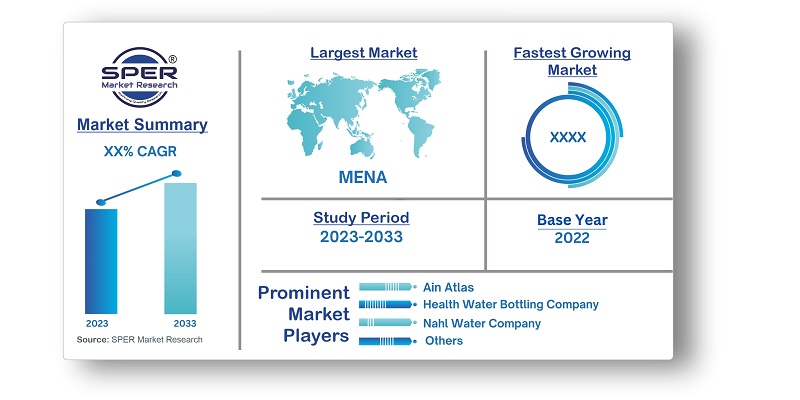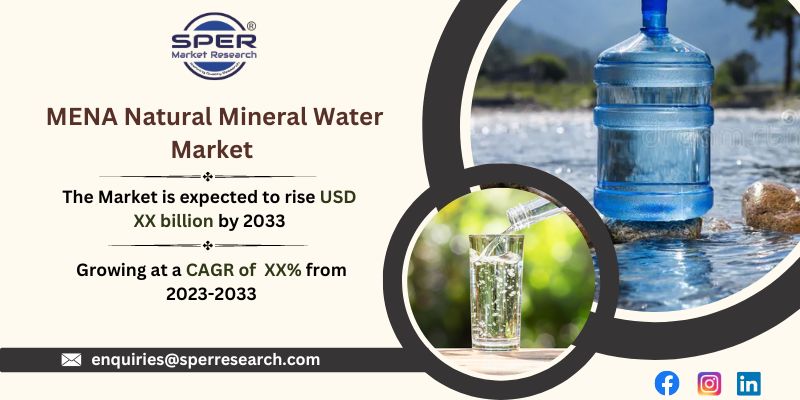
MENA Natural Mineral Water Market Growth, Size, Trends, Revenue, Scope and Future Outlook
MENA Natural Mineral Water Market Size- By Size, By Distribution Channel- Regional Outlook, Competitive Strategies and Segment Forecast to 2033
| Published: Jun-2023 | Report ID: FOOD2357 | Pages: 1 - 152 | Formats*: |
| Category : Food & Beverages | |||


| Report Metric | Details |
| Market size available for years | 2019-2033 |
| Base year considered | 2022 |
| Forecast period | 2023-2033 |
| Segments covered | By Size, By Distribution Channel |
| Regions covered | Egypt, Iran, Israel, Morocco, Qatar, Saudi Arabia, United Arab Emirates, Others |
| Companies Covered | Ain Atlas, Al Karama, Danone S.A., Health Water Bottling Company, Masafi Co LLC, Nahl Water Company, National Mineral Water Company (SAOG), PepsiCo, Inc., Sanpellegrino S.P.A. |
- Consumers
- Corporations and Offices
- Distributors and Wholesalers
- Event Organizers
- Export Markets
- Government and Regulatory Bodies
- Health and Wellness Industry
- Health Professionals
- Hotels, Restaurants, and Cafes (HoReCa)
- Retailers
- MENA Natural Mineral Water Market Value Share and Forecast, By Size, 2023-2033
- 1 to 2 Litre
- Less than 1 Litre
- More than 2 Litre
- MENA Natural Mineral Water Market Value Share and Forecast, By Distribution channel, 2023-2033
- Convenience Stores
- On Trade
- Supermarkets and Hypermarkets
- Egypt
- Iran
- Israel
- Morocco
- Qatar
- Saudi Arabia
- United Arab Emirates
- MENA Natural Mineral Water Market Size (FY’2023-FY’2033)
- Overview of MENA Natural Mineral Water Market
- Segmentation of MENA Natural Mineral Water Market By Size (1 to 2 Litre, Less than 1 Litre, More than 2 Litre)
- Segmentation of MENA Natural Mineral Water Market By Distribution Channel (Convenience Stores, On Trade, Supermarkets and Hypermarkets, Others)
- Statistical Snap of MENA Natural Mineral Water Market
- Growth Analysis of MENA Natural Mineral Water Market
- Problems and Challenges in MENA Natural Mineral Water Market
- Competitive Landscape in the MENA Natural Mineral Water Market
- Impact of COVID-19 and Demonetization on MENA Natural Mineral Water Market
- Details on Recent Investment in MENA Natural Mineral Water Market
- Competitive Analysis of MENA Natural Mineral Water Market
- Key Players in the MENA Natural Mineral Water Market
- SWOT Analysis of MENA Natural Mineral Water Market
- MENA Natural Mineral Water Market Future Outlook and Projections (FY’2023-FY’2033)
- Recommendations from Analyst
1.1. Scope of the report1.2. Market segment analysis
2.1. Research data source2.1.1. Secondary Data2.1.2. Primary Data2.1.3. SPER’s internal database2.1.4. Premium insight from KOL’s2.2. Market size estimation2.2.1. Top-down and Bottom-up approach2.3. Data triangulation
4.1. Driver, Restraint, Opportunity and Challenges analysis4.1.1. Drivers4.1.2. Restraints4.1.3. Opportunities4.1.4. Challenges4.2. COVID-19 Impacts of the MENA Natural Mineral Water Market
5.1. SWOT Analysis5.1.1. Strengths5.1.2. Weaknesses5.1.3. Opportunities5.1.4. Threats5.2. PESTEL Analysis5.2.1. Political Landscape5.2.2. Economic Landscape5.2.3. Social Landscape5.2.4. Technological Landscape5.2.5. Environmental Landscape5.2.6. Legal Landscape5.3. PORTER’s Five Forces5.3.1. Bargaining power of suppliers5.3.2. Bargaining power of buyers5.3.3. Threat of Substitute5.3.4. Threat of new entrant5.3.5. Competitive rivalry5.4. Heat Map Analysis
6.1. MENA Natural Mineral Water Market Manufacturing Base Distribution, Sales Area, Product Type6.2. Mergers & Acquisitions, Partnerships, Product Launch, and Collaboration in MENA Natural Mineral Water Market
7.1. MENA Natural Mineral Water Market Value Share and Forecast, By Size, 2023-20337.2. 1 to 2 Litre7.3. Less than 1 Litre7.4. More than 2 Litre
8.1. MENA Natural Mineral Water Market Value Share and Forecast, By Distribution channel, 2023-20338.2. Convenience Stores8.3. On Trade8.4. Supermarkets and Hypermarkets8.5. Others
9.1. MENA Natural Mineral Water Market Size and Market Share
10.1. MENA Natural Mineral Water Market Size and Market Share By Size (2019-2026)10.2. MENA Natural Mineral Water Market Size and Market Share By Size (2027-2033)
11.1. MENA Natural Mineral Water Market Size and Market Share By Distribution Channel (2019-2026)11.2. MENA Natural Mineral Water Market Size and Market Share By Distribution Channel (2027-2033)
12.1. MENA Natural Mineral Water Market Size and Market Share By Region (2019-2026)12.2. MENA Natural Mineral Water Market Size and Market Share By Region (2027-2033)12.3. Egypt12.4. Iran12.5. Israel12.6. Morocco12.7. Qatar12.8. Saudi Arabia12.9. United Arab Emirates12.10. Others
13.1. Ain Atlas13.1.1. Company details13.1.2. Financial outlook13.1.3. Product summary13.1.4. Recent developments13.2. Al Karama13.2.1. Company details13.2.2. Financial outlook13.2.3. Product summary13.2.4. Recent developments13.3. Danone S.A.13.3.1. Company details13.3.2. Financial outlook13.3.3. Product summary13.3.4. Recent developments13.4. Health Water Bottling Company13.4.1. Company details13.4.2. Financial outlook13.4.3. Product summary13.4.4. Recent developments13.5. Masafi Co LLC13.5.1. Company details13.5.2. Financial outlook13.5.3. Product summary13.5.4. Recent developments13.6. Nahl Water Company13.6.1. Company details13.6.2. Financial outlook13.6.3. Product summary13.6.4. Recent developments13.7. National Mineral Water Company (SAOG)13.7.1. Company details13.7.2. Financial outlook13.7.3. Product summary13.7.4. Recent developments13.8. Nestlé S.A.13.8.1. Company details13.8.2. Financial outlook13.8.3. Product summary13.8.4. Recent developments13.9. PepsiCo, Inc.13.9.1. Company details13.9.2. Financial outlook13.9.3. Product summary13.9.4. Recent developments13.10. Sanpellegrino S.P.A.13.10.1. Company details13.10.2. Financial outlook13.10.3. Product summary13.10.4. Recent developments13.11. Others
SPER Market Research’s methodology uses great emphasis on primary research to ensure that the market intelligence insights are up to date, reliable and accurate. Primary interviews are done with players involved in each phase of a supply chain to analyze the market forecasting. The secondary research method is used to help you fully understand how the future markets and the spending patterns look likes.
The report is based on in-depth qualitative and quantitative analysis of the Product Market. The quantitative analysis involves the application of various projection and sampling techniques. The qualitative analysis involves primary interviews, surveys, and vendor briefings. The data gathered as a result of these processes are validated through experts opinion. Our research methodology entails an ideal mixture of primary and secondary initiatives.



Frequently Asked Questions About This Report
PLACE AN ORDER
Year End Discount
Sample Report
Pre-Purchase Inquiry
NEED CUSTOMIZATION?
Request CustomizationCALL OR EMAIL US
100% Secure Payment






Related Reports
Our Global Clients
Our data-driven insights have influenced the strategy of 200+ reputed companies across the globe.




















